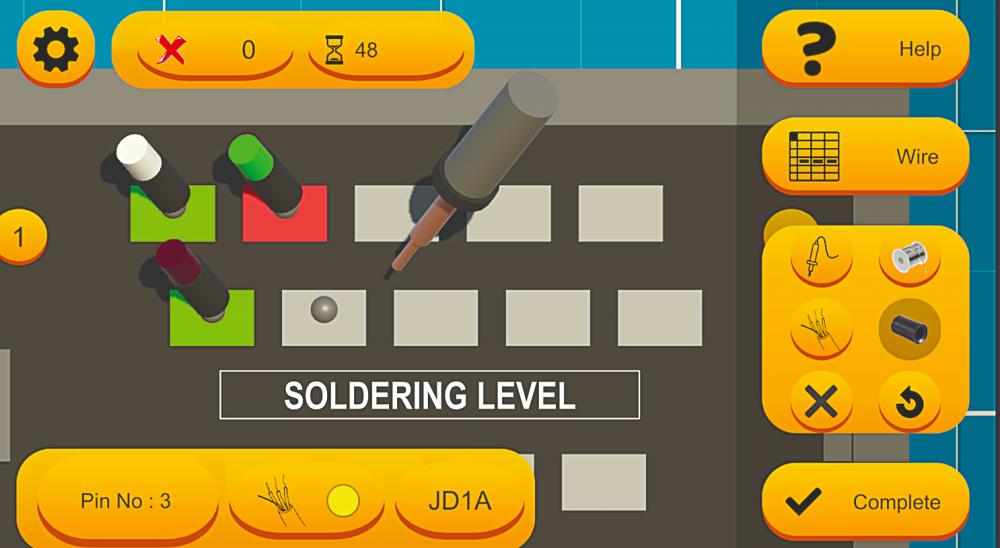When technology is powered by creativity and innovation, it is another step forward into the future that awaits us. In the world of gaming, for instance, it is already a trend where games are used as effective teaching and learning tools. Gamification is the name of this trend and it is gaining traction in the industries to train employees effectively and efficiently.
As students of interactive software technology, what better way to put to good use the knowledge they have learnt in developing interactive games as effective training tools in companies! This is why industry collaborations and partnerships are important components of the Beyond Education experience at Tunku Abdul Rahman University of Management and Technology (TAR UMT), where students are able to work with industries even while studying at TAR UMT.
For Chee Juen Wei, a Bachelor of Computer Science (Hons) in Interactive Software Technology student at TAR UMT for example, had the opportunity of working with two of his coursemates to develop multiple mini-games for a manufacturing company as training tools to help its employees familiarise themselves with certain processes in the assembly line. This was an important task for the company in order to reduce wastage and training time.
The project was quite a challenge for Juen Wei and his coursemates, especially to properly understand what the company required of the games they were developing. “My friends and I started working on this project during the Covid-19 lockdown. As physical meetups were not possible, we relied completely on materials and information provided by the company to understand their assembly line and what are the important knowledge and information the factory employees need to remember to do their work well. These insights were the fundamentals that we needed to fully comprehend before we could develop the required mini-games for this project. However, not being able to visit the factory and seeing how the assembly lines work provided us with many limitations which resulted in us not being able to properly develop the games,” he explained.
He further added: “Another major challenge we had to deal with is the language barrier as the end users for the games we are developing are foreigners and English is not their main language. This limitation required us to then use more graphics as compared to words in developing the games.”
These major hurdles were a great challenge for the students to develop the games properly. However, things started to turn for the better when the lockdowns were lifted and Juen Wei was able to visit the factory and spend quality time with the supervisors to compile the required inputs which helped him and the team to better enhance the games.
“The company understood the challenges we were facing and this is why they bore the expenses for my trip to the factory during my semester break so that I can further enhance the game the team was working on. It was like a short internship where my whole day was spent in the factory with several supervisors who thoroughly explained everything I needed to know about the assembly line.”
The experience was fulfilling as I also had the opportunity to be part of the company’s team-building activities and I am amazed to see how well the company’s employees work as a team. Experiencing this first-hand was uplifting and I am hopeful that I too will be part of a dynamic team once I graduate,” he went on.
Guiding the students at each stage of this project is Ts Andrew Tan Khin Huat, Programme Leader in the Department of Computer Science and Embedded Systems, Faculty of Computing and Information Technology (FOCS).
“Gamification is an effective training tool as it engages important senses in learning such as sight, hand movements and quick thinking to complete the game. And although this project was quite a complex task for the students to complete, I am happy that this project exposed the team to work with industry professionals and for the company to actually use what the students have built as one of their training tools.”
There are several goals I have outlined for the students to learn and benefit from this project. The first is to ensure the students communicated well with the company’s supervisors to understand what the supervisors were looking for. In addition, I also probe Juen Wei and the others on the team with questions and scenarios to enhance their attention to detail and to also train them to think of different ways of solving the limitations they face.”
I also wanted the students to learn a higher level of time and task management which includes prioritising the purpose and goals of the project over other issues and problems they may encounter. This is important to ensure the end result of their effort and hard work not only meets but exceeds expectations. And the students have achieved this because the company supervisors were happy with the students’ results and plan to continue collaborating with the faculty for future projects,” Ts Andrew detailed.
To find out more about TAR UMT’s computing and information technology programmes offered in 2023, please visit us during our 2023 Open Day from 20 - 21 and 27 - 28 May at TAR UMT KL Campus and/or all TAR UMT branches nationwide. You can also contact the Faculty of Computing and Information Technology at 6011-10758554.
Alternatively, you can find out more about our programmes or apply online at tarc.edu.my. Various financial aid and merit scholarships are available for qualified students.









